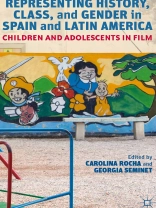This anthology explores the role of children and teenagers in Latin American and Spanish Film as protagonists, victims and witnesses of societies polarized by and still grappling with the consequences of political divisions.
Table of Content
PART I: MEMORY AND TRAUMA Introduction; C.Rocha & G.Seminet Surviving Childhood: The Nepantla Generation as Portrayed in On the Empty Balcony by Jomí García Ascot (1962); J.Tuñón Fairies, Maquis, and Children Without Schools: Romantic Childhood and Civil War in Pan’s Labyrinth; A.G.L.Quiñones A Child’s Voice, a Country’s Silence: Ethnicity, Class and Gender in El Ilencio de Neto (1996); G.Seminet Children’s Views of State-Sponsored Violence in Latin America: Machuca and The Year My Parents Went on Vacation; C.Rocha Enabling, Enacting and Envisioning Societal Complicity: Daniel Bustamante’s Andrés No Quiere Dormir la Siesta (2009); J.Breckenridge PART II: CHILDHOOD AND PATHS TO CITIZENSHIP IN FILM Innocence Interrupted: Neoliberalism and the End of Childhood in Recent Mexican Cinema; I.S.Prado From Buñuel to Eimbcke: Orphanhood in Recent Mexican Cinema; D.Russek Through ‘Their’ Eyes: Internal and External Focalizing Agents in the Representation of Children and Violence in Iberian and Latin American Film; E.Ledesma Roads to Emancipation: Sentimental Education in Viva Cuba; R.D.Zambrana PART III: GENDER IDENTITY Constructing Ethical Attention in Lucía Puenzo’s XXY: Cinematic Strategy, Intersubjectivity, and Intersexuality; J.Zamostny Cinematic Portrayals of Teen Girls in Brazil’s Urban Peripheries: Realist and Subjectivist Approaches to Adolescent Dreams and Fantasy in Sonhos Roubados and Nina; J.Draper No Longer Young: Childhood, Family, and Trauma in Las Mantenidas Sin Sueños; B. Urraca
About the author
Carolina Rocha is an associate professor of Foreign Languages and Literature at Southern Illinois University Edwardsville.












